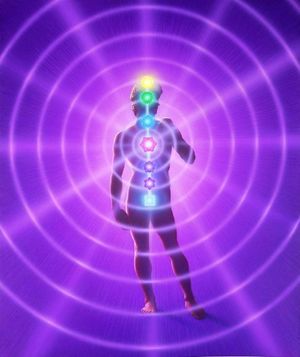Chakra

Chakra [Sanskrit for “wheel,” “disc,” “circle”] is a term used to denote the centers of light anchored in the etheric body and governing the flow of energy to the four lower bodies of man.
There are seven major chakras corresponding to the seven rays, five minor chakras corresponding to the five secret rays, and a total of 144 light centers in the body of man.
Functions of the chakras
Djwal Kul explains the functions of the chakras:
Each of the chakras has a special function, and we shall consider these functions step by step. Each of the wheellike vortices that comprise the chakras has, according to the teachings of the masters of the Himalayas, a certain frequency that is marked by a number of petals, so-called. These petals determine the flow of the energies of God to man, and they govern certain aspects of God’s consciousness, commonly called virtues, which may be amplified within the chakras.
The chakras that are presently operative in the being of man are anchored in the lower etheric body, and their positions conform to the organs in the physical body which receive the flow of vitality from the higher bodies necessary to its functioning. These chakras are located at the base of the spine, over the spleen, over the navel, over the heart, at the throat, on the brow, and at the crown.
The placement of these chakras to correspond with nerve centers in the physical body was adjusted during the epoch of the Fall of Man. There remains, however, in the higher etheric body the line of the seven chakras as forcefields for the seven rays; and these are for the distribution in the four lower bodies of the frequencies of the seven Elohim, known as the seven Spirits of God.[1]
The seven major chakras, their rays, Sanskrit names, and colors are as follows:
| Ray | Chakra | Sanskrit name | Color | Petals |
|---|---|---|---|---|
| First ray | throat | Vishuddha | blue | 16 |
| Second ray | crown | Sahasrāra | yellow | 972 |
| Third ray | heart | Anāhata | pink | 12 |
| Fourth ray | base of the spine | Mūlādhāra | white | 4 |
| Fifth ray | third eye | Ajñā | green | 96 |
| Sixth ray | solar plexus | Manipūra | purple and gold | 10 |
| Seventh ray | seat of the soul | Svādhishthāna | violet | 6 |
| Eighth ray | Secret chamber of the heart | Ananda-Kanda | between pink and gold, a peach color | 8 |
The hands, feet, and thymus represent the five secret-ray chakras.
Music and the chakras
| Chakra | Corresponding rhythm | Musical instrument |
|---|---|---|
| Base | 4/4 | drum |
| Seat of the soul | 6/8 | woodwind |
| Solar plexus | 5/4 | organ |
| Heart | 12/8 (without) 3/4 (within) |
harp |
| Throat | brass | |
| Third eye | 2/4 | piano |
| Crown | strings | |
| Secret chamber of the heart | harpsichord | |
| Seven chakras | 7/4 | |
| Rings of the causal body that form around each succeeding chakra in the course of self-mastery |
12/4 |
Geographical chakras
► Main article: Geographical chakras
States, nations and continents also have chakras, geographical areas where the energies of the seven rays are anchored and released.
For more information
Elizabeth Clare Prophet and Patricia R. Spadaro, Your Seven Energy Centers: A Holistic Approach to Physical, Emotional and Spiritual Vitality.
Kuthumi and Djwal Kul, The Human Aura: How to Activate and Energize Your Aura and Chakras.
Mark L. Prophet and Elizabeth Clare Prophet, Lost Teachings of Jesus 2: Mysteries of the Higher Self.
Elizabeth Clare Prophet, Chakra Meditations and the Science of the Spoken Word (audio album).
Elizabeth Clare Prophet, Saint Germain’s Heart Meditations I & II (audio album).
For more about music and the chakras:
Elizabeth Clare Prophet, The Power of Music to Create or Destroy (DVD).
See also
Sources
Mark L. Prophet and Elizabeth Clare Prophet, Saint Germain On Alchemy: Formulas for Self-Transformation.
Elizabeth Clare Prophet, October 7, 1977.
Elizabeth Clare Prophet, December 13, 1973.
- ↑ Kuthumi and Djwal Kul, The Human Aura: How to Activate and Energize Your Aura and Chakras, book 2, chapter 3.
